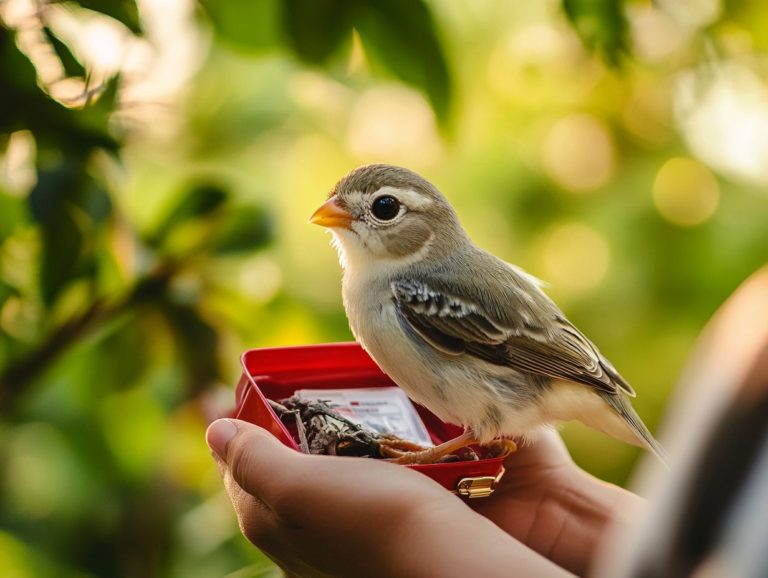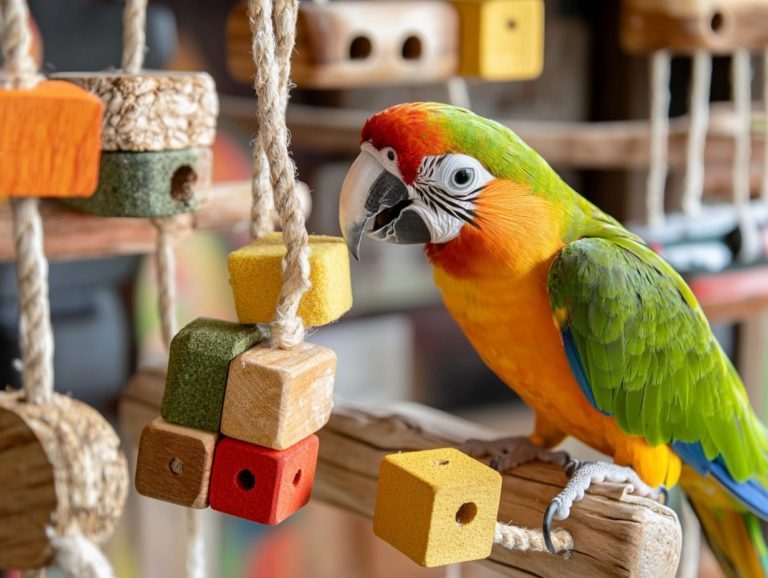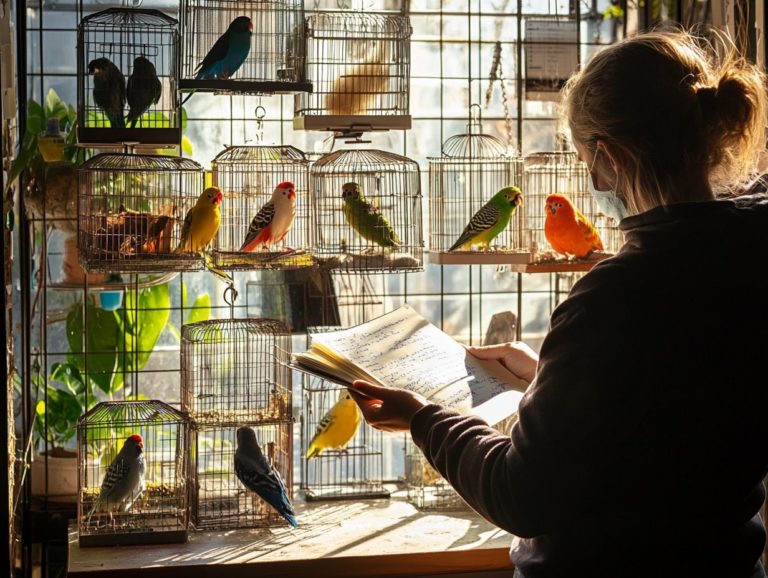How to Monitor Your Bird’s Weight
Keeping a close watch on your bird’s weight is essential for its overall health and well-being. Just like with humans, a bird’s weight can offer valuable insights into its physical condition. Regular monitoring and tracking weight can help detect any signs of illness early on.
This article delves into the importance of monitoring your bird s weight, the tools you need for accurate measurements, and provides a straightforward step-by-step guide to weighing your bird. It also outlines what a healthy weight looks like for different species, factors that can cause weight fluctuations, and when it’s time to reach out for veterinary consultation.
Understanding these key points will empower you to keep your bird happy and healthy!
Contents
Key Takeaways:
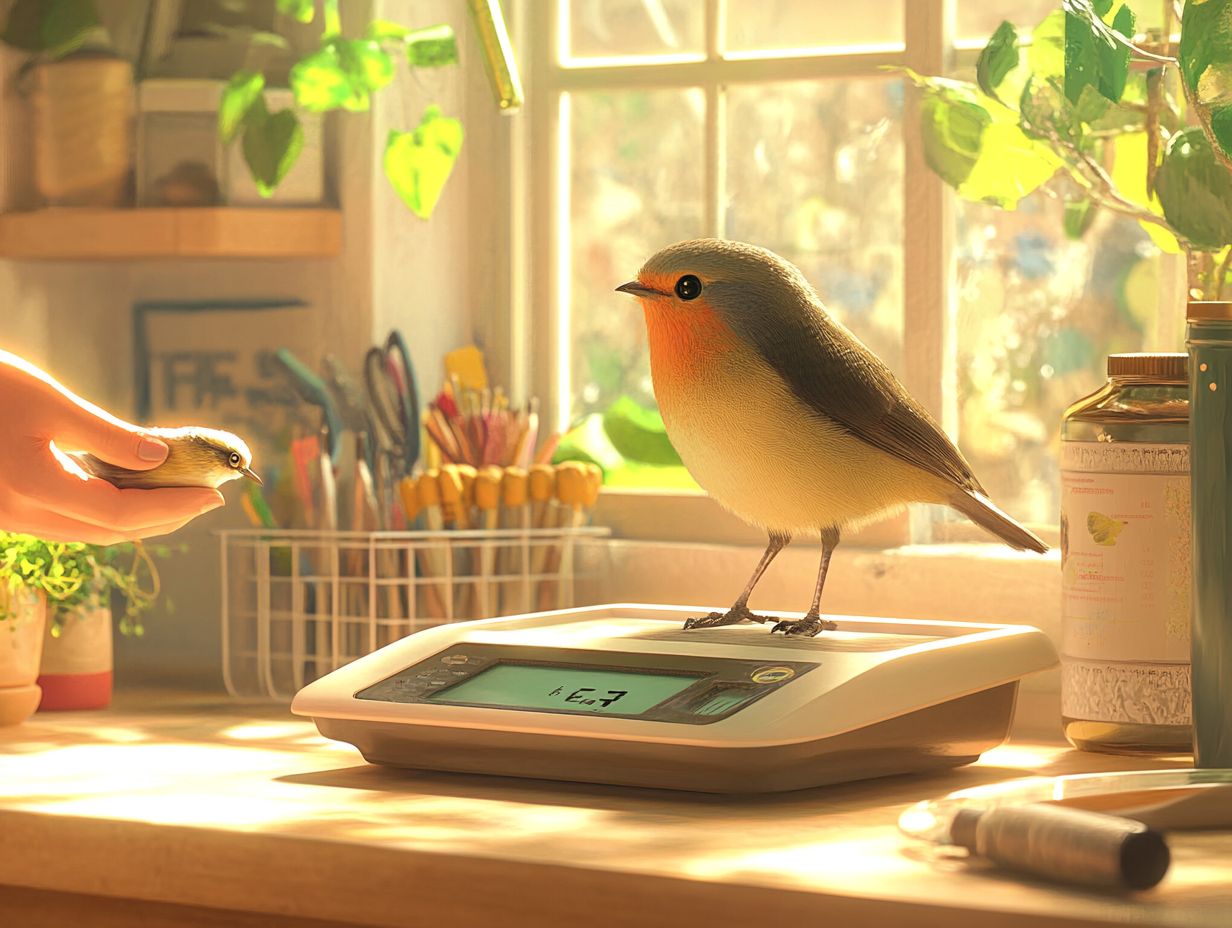
- Regularly monitoring your bird’s weight is crucial for its overall health and well-being.
- Use proper tools and techniques, such as scales, to accurately measure your bird’s weight.
- Understanding the normal weight range for your bird’s species and identifying any significant changes can help detect potential health issues early on.
The Importance of Monitoring Your Bird’s Weight
Monitoring your bird’s weight is essential for ensuring its overall health and well-being. For parrot owners in particular, tracking weight fluctuations serves as a vital indicator of wellness and can be crucial for understanding bird health.
Conducting regular weight assessments allows you to detect early signs of illness. It also helps maintain a healthy weight for your feathered companion critical aspects of bird care and weight monitoring.
By appreciating the importance of daily weight tracking, you can take proactive measures to ensure your pet bird’s health and happiness, enhancing its overall well-being.
Why Weight is an Important Indicator of Health
Weight serves as one of the most reliable indicators of health in birds. Both weight loss and weight gain can signal underlying health issues that demand your immediate attention.
Monitoring your bird’s weight should be an integral part of a holistic approach to pet care. Fluctuations can reflect not just dietary changes but also shifts in behavior patterns or stress factors in their environment.
For example, if you notice an increase in weight, it might suggest overfeeding or a more sedentary lifestyle. Conversely, a sudden drop could indicate illness, inadequate nutrition, or emotional distress.
Regular consultations with a veterinarian are crucial for addressing weight variations and ensuring that dietary regimens are balanced and tailored to your bird s specific needs. This promotes optimal bird nutrition. The importance of consistent health monitoring cannot be overstated; it lays the groundwork for a long and healthy life for your feathered companion.
Tools for Measuring Your Bird’s Weight
To effectively monitor your bird’s weight, you have a range of tools at your disposal. Consider using a bird scale or a gram scale, which measures small weights, designed for precise measurements, as these devices can enhance your bird monitoring practices.
These instruments can easily be woven into your daily routine, enhancing your bird care practices and ensuring accurate weight assessments.
Scales and Other Equipment
Bird scales specifically designed for avian species are critical tools for weight monitoring. They allow for accurate weight assessments and facilitate body fat measurement, ensuring the health of your feathered companions.
These scales come in various types to suit your needs. For larger birds, platform scales offer a stable and spacious area, while digital pocket scales provide convenience for smaller species, making weight tracking simple.
Each type has its unique advantages; digital scales, for instance, deliver precise readings capable of detecting even the slightest changes in weight. This is a critical feature for species vulnerable to obesity and managing bird metabolism effectively.
Regular weight checks enable you to identify potential health issues early, giving you the chance to consult avian veterinarians for timely interventions. By helping your birds maintain their ideal body condition, you play a vital role in enhancing their overall well-being and ensuring they meet their true weight range.
How to Weigh Your Bird
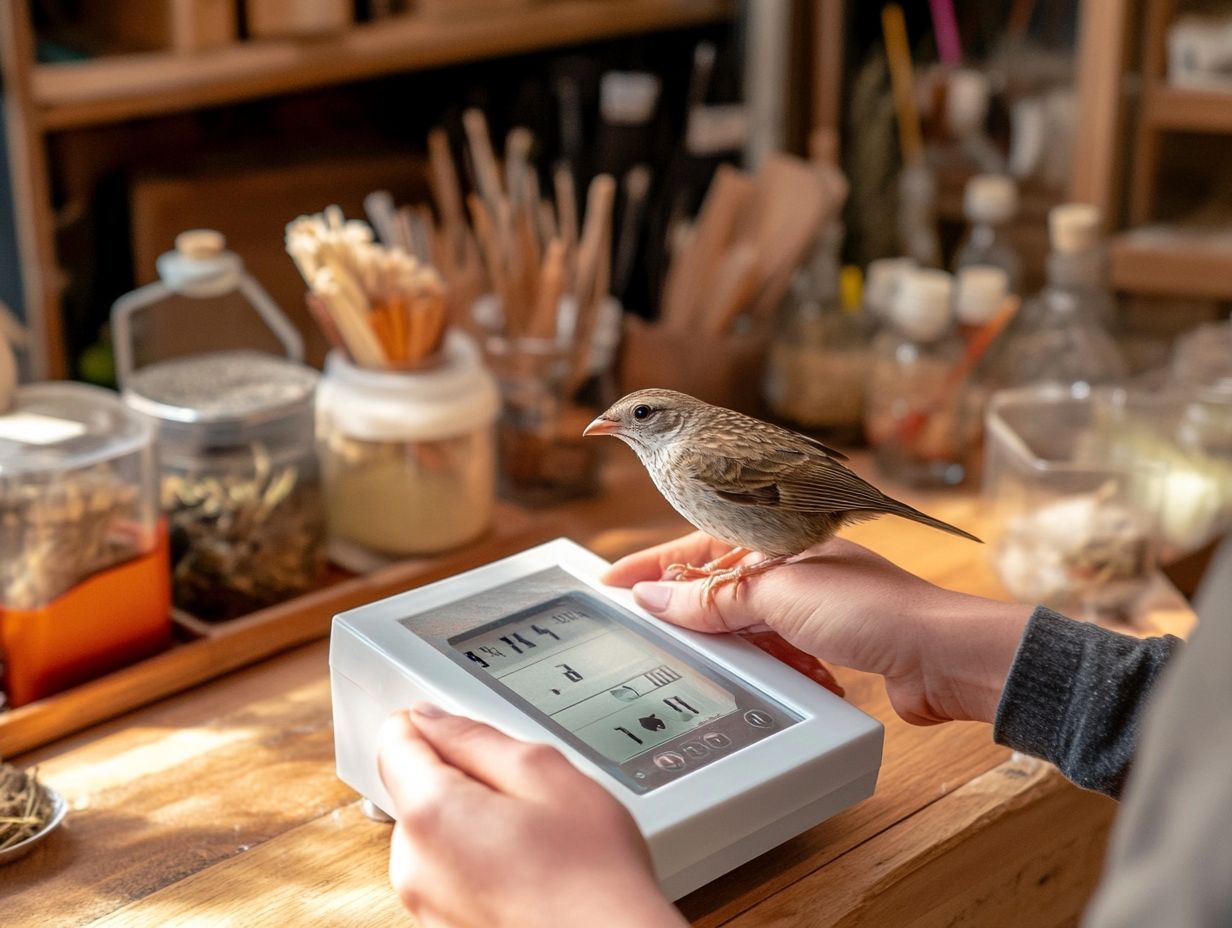
Accurately weighing your bird is crucial for reliable weight assessments. Utilizing a bird scale effectively allows you to establish a daily weight routine that promotes optimal health and consistent results.
This diligence enhances your bird’s well-being and enables you to monitor any changes in behavior or food intake that may require attention.
Step-by-Step Guide
Following a step-by-step guide for weighing your bird simplifies the process and helps you monitor its weight as part of your daily routine. This ensures effective weight management.
To begin, select a quiet location to minimize stress during the weighing process. Stress can impact accurate weight assessments. Using a bird-safe scale is crucial, as digital scales typically offer accurate readings.
Gently handle your bird to keep it calm. You can cover it with a soft cloth to create a comfortable environment during monitoring.
Tracking changes in weight over time provides valuable insights into your bird s health and dietary needs, helping you identify necessary adjustments. Consistency in feeding habits is vital; pay attention to usual portion sizes and ensure they remain steady. Record the measurements on a weight chart for easy reference, which is crucial for tracking fluctuations.
If you notice any sudden weight changes, act quickly to identify potential causes, such as changes in diet or environment. This allows you to address any concerns promptly and maintain your bird’s health.
Interpreting Your Bird’s Weight
Interpreting your bird’s weight is vital for understanding its overall health. By knowing the normal weight range for various species, you can accurately gauge changes in weight and assess body condition, ensuring proper care.
This knowledge equips you to make informed decisions for your bird’s well-being.
Normal Weight Range for Different Species
Understanding the normal weight range for different species is essential for you as a pet bird owner. It helps monitor your bird’s health effectively and guides your decisions regarding veterinary consultations and identifying signs of illness early.
By keeping an eye on your feathered friend’s weight, you can spot any changes that might signal underlying health issues, prompting timely veterinary consultation. For example, a healthy cockatiel typically weighs between 80 to 100 grams, while a parrot’s weight can vary significantly by species, ranging from 200 to 1,500 grams or even more. This emphasizes the importance of tracking weight in bird health.
Using a weight chart tailored to various species allows you to monitor these crucial metrics effectively. Regular weigh-ins ensure your birds maintain a stable, healthy weight, enabling you to make necessary dietary adjustments or schedule veterinary visits to address any concerns and promote their overall well-being.
Factors that Affect Your Bird’s Weight
Various factors influence your bird’s weight, including diet, exercise, and external stressors. Understanding these elements is crucial for effectively managing weight gain or loss through bird metabolism.
Recognizing their interplay is essential for maintaining your bird’s optimal health and well-being.
Diet, Exercise, and Other Factors
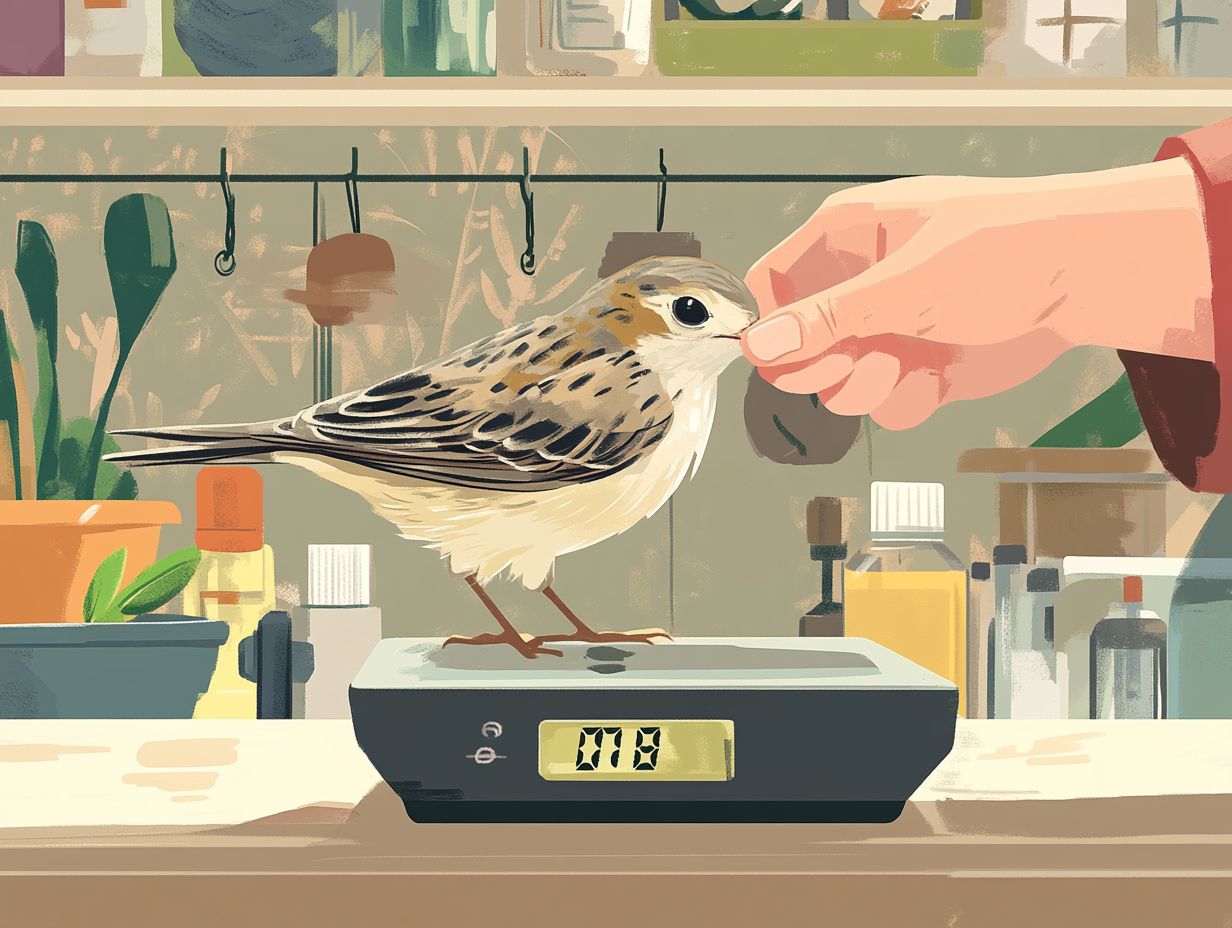
Maintaining your bird’s weight hinges on a healthy diet and regular exercise. Imbalanced feeding habits can disrupt their metabolism and compromise overall bird nutrition, making dietary adjustments essential.
Proper bird nutrition is not just a luxury; it s vital for ensuring your bird receives the nutrients necessary for its well-being. Focus on incorporating a diverse array of fresh fruits and vegetables, as these provide essential vitamins and support a healthy weight. While seed mixes might be a favorite treat, offer them in moderation, since they often lack critical nutrients. High-quality pellets can be a cornerstone of balanced nutrition, filling in the gaps and ensuring a healthy diet.
Regular exercise opportunities, such as flight or playtime, are crucial. They aid in weight management and promote mental stimulation and social interaction, both fundamental for your bird s happiness and health, supporting natural behaviors.
When to Seek Veterinary Help
Understanding when to seek veterinary assistance is essential for your bird’s well-being. Be vigilant for signs of unhealthy weight changes, as these can indicate underlying health issues that may require early intervention.
Taking prompt action can make a significant difference in ensuring your feathered friend remains healthy and happy.
Signs of Unhealthy Weight Changes
Recognizing signs of unhealthy weight changes in your bird, whether it s weight loss or gain, is crucial for maintaining bird health. Pay attention to behavior patterns and energy levels, which may indicate illness.
Being vigilant about your bird’s eating habits, energy levels, and feather condition can offer valuable insights into its overall well-being. For example, sudden weight loss might present through increased lethargy, decreased appetite, or notable behavioral changes. Conversely, excess weight could make flying difficult or lead to inactivity, indicating potential health problems.
Keep a close eye on these signs! Monitoring these closely allows for timely veterinary consultations and early intervention for your bird’s health. Regular weigh-ins can help you identify gradual shifts in weight, enabling prompt adjustments to diet and care, ensuring your feathered companion remains both happy and healthy.
Frequently Asked Questions
How can I monitor my bird’s weight at home?
To monitor your bird’s weight at home, use a digital scale specifically designed for small animals. Place your bird on the scale and record the weight regularly to keep track of any changes.
What is a healthy weight range for my bird?
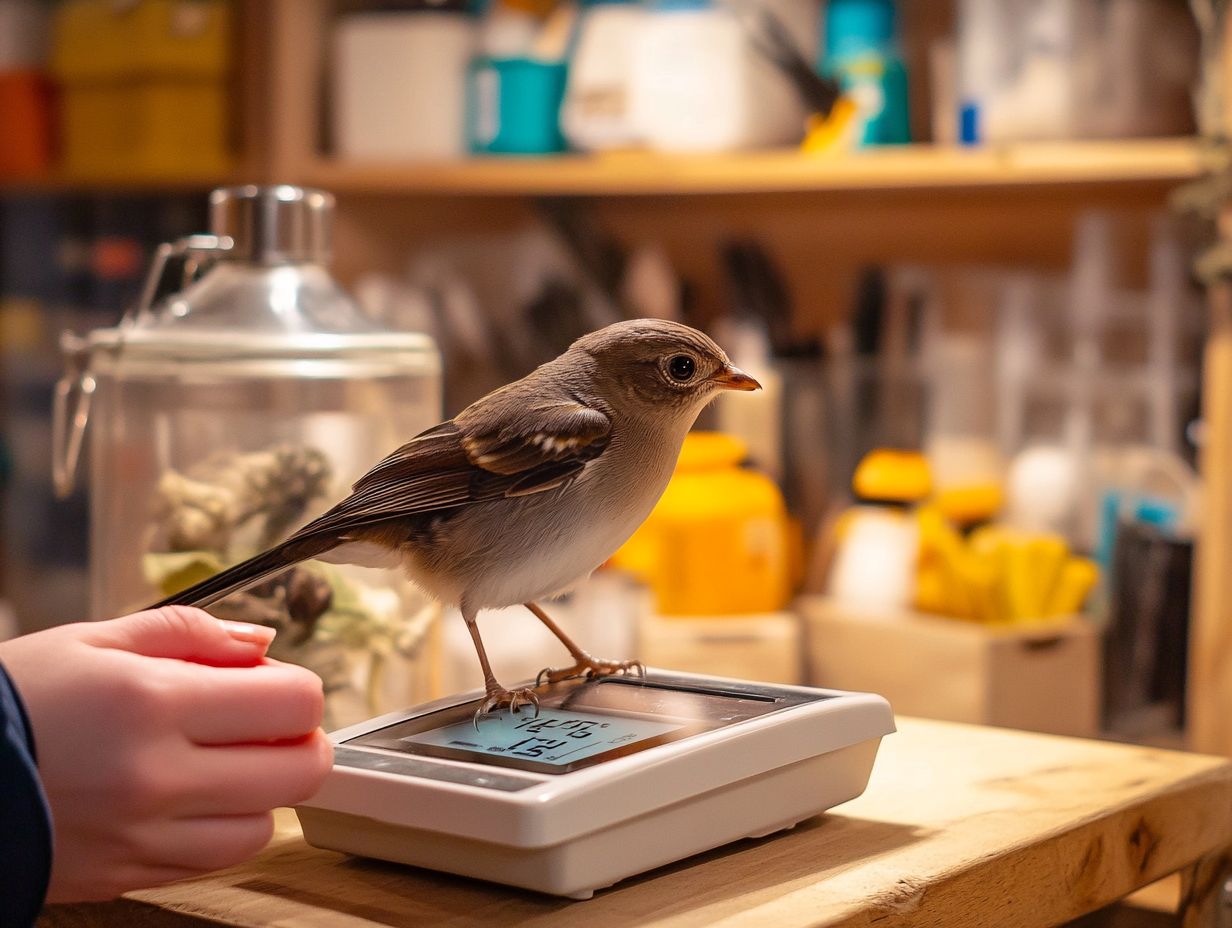
The healthy weight range for birds varies depending on species and size. It is best to consult with your veterinarian to determine the ideal weight for your specific bird.
Why is it important to monitor my bird’s weight?
Monitoring your bird’s weight helps detect health changes and can be an early indicator of potential issues. Catching weight changes early prevents further health complications.
How often should I weigh my bird?
For adult birds, weigh them once a month. However, young or sick birds may need to be weighed more frequently, as directed by a veterinarian.
What are some signs that my bird may be losing or gaining weight?
- Signs of weight loss include a decrease in appetite, decreased energy, and a more prominent breastbone.
- If your bird is gaining weight, you may notice a decrease in activity level and difficulty flying.
For any concerns regarding your bird’s weight or health, consult your veterinarian for personalized advice.
Can I use a regular kitchen scale to weigh my bird?
No, you should not use a regular kitchen scale for weighing your bird. These scales often lack the sensitivity needed to detect small weight changes.
Instead, opt for a scale designed specifically for small animals or birds. This will give you accurate measurements and help monitor your pet’s health.

